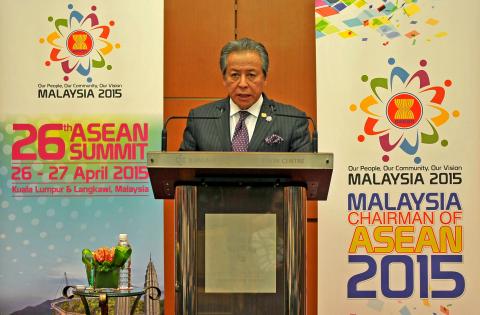Beijing is poised to take “de facto control” of the South China Sea, the Philippines said yesterday, but its call for a robust regional response at a summit was shot down.
Alongside Taiwan, ASEAN members Vietnam, Philippines, Malaysia and Brunei claim parts of the body of water, but Beijing claims almost all of it; its territorial assertions have caused concern in the region and beyond.
“[China] is poised to consolidate de facto control of the South China Sea,” Philippine Secretary of Foreign Affairs Albert del Rosario said in Kuala Lumpur a day ahead of an annual ASEAN summit.

Photo: AFP
He cited land reclamation on disputed reefs that has raised the specter of Chinese bases from which it can enforce its claims.
“Is it not time for ASEAN to say to our northern neighbor that what it is doing is wrong and that the massive reclamations must be immediately stopped?” del Rosario asked his fellow ministers. “Is it not time for ASEAN to finally stand up for what is right?”
However, summit host Malaysia rejected the idea of a response that could antagonize China.
“We must avoid any action that would be counterproductive and bring us further apart, either among ourselves, or with China,” Malaysian Minister of Foreign Affairs Anifah Aman said.
“I do not think ASEAN would like to be given an ultimatum, and by the same token I do not think China would like to be given an ultimatum,” he said.
Faced with Beijing’s immense trade and diplomatic leverage, ASEAN has a history of failing to agree on strong responses over the issue on behalf of its members with disputed maritime claims.
Concern over Chinese land reclamation was reignited this month by satellite photos showing huge amounts of sand being dredged and dumped onto fragile coral reefs claimed by the Philippines.
Defense analysts say these works are creating land masses big enough for airstrips and other facilities, raising the specter of deepening Chinese domination of a vital conduit for much of world trade.
A draft statement prepared well before the gathering began called for “self-restraint” at sea, but avoided direct criticism of China, a diplomatic source said previously.
“ASEAN member-states want to see that this matter should be settled amicably,” Anifah said, adding that he suggested China someday allow joint use of the islands it is constructing.

CHAOS: Iranians took to the streets playing celebratory music after reports of Khamenei’s death on Saturday, while mourners also gathered in Tehran yesterday Iranian Supreme Leader Ayatollah Ali Khamenei was killed in a major attack on Iran launched by Israel and the US, throwing the future of the Islamic republic into doubt and raising the risk of regional instability. Iranian state television and the state-run IRNA news agency announced the 86-year-old’s death early yesterday. US President Donald Trump said it gave Iranians their “greatest chance” to “take back” their country. The announcements came after a joint US and Israeli aerial bombardment that targeted Iranian military and governmental sites. Trump said the “heavy and pinpoint bombing” would continue through the week or as long

TRUST: The KMT said it respected the US’ timing and considerations, and hoped it would continue to honor its commitments to helping Taiwan bolster its defenses and deterrence US President Donald Trump is delaying a multibillion-dollar arms sale to Taiwan to ensure his visit to Beijing is successful, a New York Times report said. The weapons sales package has stalled in the US Department of State, the report said, citing US officials it did not identify. The White House has told agencies not to push forward ahead of Trump’s meeting with Chinese President Xi Jinping (習近平), it said. The two last month held a phone call to discuss trade and geopolitical flashpoints ahead of the summit. Xi raised the Taiwan issue and urged the US to handle arms sales to

State-run CPC Corp, Taiwan (CPC, 台灣中油) yesterday said that it had confirmed on Saturday night with its liquefied natural gas (LNG) and crude oil suppliers that shipments are proceeding as scheduled and that domestic supplies remain unaffected. The CPC yesterday announced the gasoline and diesel prices will rise by NT$0.2 and NT$0.4 per liter, respectively, starting Monday, citing Middle East tensions and blizzards in the eastern United States. CPC also iterated it has been reducing the proportion of crude oil imports from the Middle East and diversifying its supply sources in the past few years in response to geopolitical risks, expanding

OTHER OPTIONS: Given possible US intervention and Taiwanese counterattacks, China might opt to blockade Taiwan or take its outlying islands instead of an all-out invasion A US think tank has urged Taiwan to adopt a “hellscape” strategy that would flood the Taiwan Strait with drones and other uncrewed systems to deter invasion by China. In its report, Hellscape for Taiwan, published on Thursday, the Center for a New American Security said Taipei’s asymmetric defense approach — often described as a “porcupine strategy” — needs to evolve to keep pace with the growing capabilities of the Chinese People’s Liberation Army. The “hellscape” strategy involves saturating the air and waters around Taiwan with thousands of drones and other platforms capable of striking invading forces from multiple domains at once. Long-range